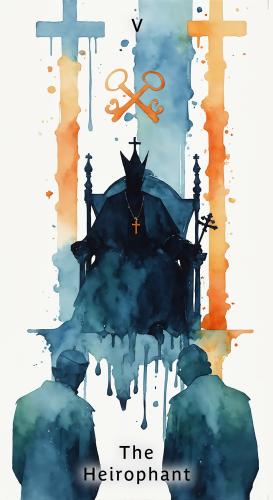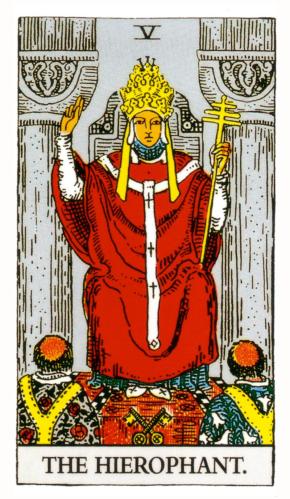Personal Reflections
Have you ever noticed how life often presents us with the very experiences we need, even when we think we're looking for something else entirely? In my tarot therapy practice, I've witnessed the Hierophant's gentle wisdom guide people towards unexpected revelations. Let me share the stories of Emily and Marcus, two souls whose encounters with this card led to beautiful moments of self-discovery.
Emily, a thoughtful 32-year-old with curious eyes, came to me feeling a bit lost in her spiritual journey. She'd been exploring various practices on her own for years, meditating, reading widely, and seeking answers within. But lately, she felt like she was walking in circles in a vast, foggy field. As we laid out the cards, the Hierophant appeared upright, its gaze warm and inviting.
"Emily," I said, gesturing to the card, "the Hierophant has joined our conversation. It often represents the value of shared wisdom and community on our spiritual paths. What comes to mind when you think about seeking guidance from established traditions or teachers?"
Emily's brow furrowed slightly, a small smile playing at the corners of her mouth. "You know, I've always been a bit of a lone wolf in my spiritual practice. The idea of organized anything makes me feel... itchy."
I nodded, understanding her hesitation. "It's interesting how we sometimes resist the very thing that might help us grow. What if we look at it differently? Instead of losing something by connecting with others, what might you gain from a spiritual community or mentor?"
Emily tilted her head, considering. "Well, I suppose there's a wealth of knowledge in traditions that have stood the test of time. And maybe... having a guide could help me see the forest instead of just the trees I've been bumping into?"
This gentle shift in perspective opened a new path for Emily. Over the next few months, she began attending a local meditation center. She found a teacher whose words resonated with her heart and joined a study group that felt like coming home. The last time I saw her, Emily's eyes shone with a quiet joy. "It's funny," she shared, her voice soft with wonder, "I was afraid I'd lose myself in someone else's teachings. But instead, I've found a mirror that helps me see myself more clearly. And the community... it's like we're all holding lanterns for each other as we walk this path."
Now, Marcus's story took a different turn, showing us how the Hierophant sometimes asks us to dance to a different tune. A 35-year-old accountant, Marcus had been dutifully climbing the corporate ladder for years when he came to me for a reading. As I turned over the Hierophant card, it was reversed, as if gently suggesting a change in perspective.
"Marcus," I said, "the Hierophant here seems to be inviting us to look at things from a new angle. When reversed, it often suggests it might be time to question the conventional path we're on. What aspects of your life feel most... let's say, in need of a fresh breeze?"
Marcus took a deep breath, his gaze distant. "You know, I've been feeling... not quite myself lately. Like I'm wearing a suit that doesn't quite fit, both literally and figuratively." A small chuckle escaped him. "I've always had this wild dream of doing stand-up comedy, but it seemed so... impractical."
I nodded encouragingly. "The reversed Hierophant often reminds us that our unique path might sometimes diverge from the expected one. If you were to give yourself permission to explore this dream, even in a small way, what might that look like?"
This question sparked a gentle journey of self-discovery for Marcus. Over the next year, he began taking improv classes and performing at open mic nights while maintaining his day job. The last I heard, he was developing a unique comedy routine that blended his financial expertise with humor, finding joy in educating audiences about money management through laughter. "Who knew," he told me with a grin, "that my years of accounting would become the perfect material for comedy?"
These stories remind us that the Hierophant's influence can manifest in various ways, always inviting us to examine our relationship with tradition and innovation. In a larger spread, this card often points to the role of conventional wisdom in our lives, but also our power to reinterpret and reshape these conventions.
For instance, in a career reading, the Hierophant might prompt questions about mentorship or formal education, but also about how to bring fresh perspectives to established fields. In a relationship spread, it could spark discussions about shared values and commitment, while also exploring how to keep the relationship dynamic and growing.
The Hierophant also asks us to consider the balance between external teachings and inner wisdom. Unlike cards such as the Empress or the Hermit, which encourage looking within for answers, the Hierophant reminds us of the value of established knowledge and societal structures. This doesn't mean blindly following tradition, but rather understanding and appreciating the wisdom that has been passed down, then deciding how to apply or adapt it to our unique situations.
Moreover, the Hierophant carries a strong community aspect. In a spread addressing social issues, this card might suggest turning to established community institutions for support and guidance, while also considering how these institutions might evolve to better serve changing needs.
Whether upright or reversed, the Hierophant invites us to examine our relationship with tradition, community, and external sources of wisdom. It challenges us to find authenticity in our choices, reminding us that sometimes the most unconventional path is following convention, and sometimes, the most traditional thing you can do is be true to yourself. In tarot therapy, this card often opens the door to profound discussions about personal values, societal expectations, and the courage to forge our own paths while honoring the wisdom of those who came before us.
Symbolism
- Triple Crown: Dominion over the three worlds (physical, mental, spiritual)
- Keys: Access to spiritual knowledge and heavenly realms
- Pillars: Stability, structure, and the balance between mercy and severity
- Hand Gesture: Blessing and teaching
- Acolytes: Students or followers of traditional wisdom
- Robe: Ceremonial authority and spiritual leadership
Historical Background
The Hierophant, also known as the Pope or High Priest in some decks, has a rich history that reflects our evolving relationship with tradition and authority. Its roots reach deep into religious and spiritual leadership, but over time, it has come to represent something much broader and more inclusive.
The term "Hierophant" comes from the Ancient Greek "hierophantes," meaning "one who shows sacred things." In ancient Greek religion, the Hierophant was a revered priest who interpreted sacred mysteries and esoteric principles. They stood as a bridge between the divine and the earthly, helping people make sense of the great unknowns.
As society's understanding of knowledge and institutions has evolved, so too has the meaning of the Hierophant card. It has expanded to encompass various forms of traditional authority and structured learning. This evolution mirrors our changing relationship with established systems and the ways we pass down wisdom from generation to generation.
Pairings
- The Hierophant + The Empress: Nurturing growth through traditional methods
- The Hierophant + The Hermit: Seeking wisdom through both external guidance and inner reflection
- The Hierophant + The Tower: Dramatic shifts in belief systems or institutional structures
- The Hierophant + The Fool: Balancing traditional knowledge with new experiences
- The Hierophant + The High Priestess: Merging conventional wisdom with intuitive understanding
Be Aware of...
- The influence of societal expectations on personal choices
- The role of mentors and teachers in one's life
- Potential conflicts between personal beliefs and established norms
- The balance between tradition and innovation
- The need for structure versus the desire for freedom
- The impact of educational or religious institutions
- The process of seeking and sharing wisdom
Exercises and Meditations
- How do societal expectations influence my personal choices?
- What traditional beliefs or practices do I find meaningful, and why?
- In what areas of my life do I tend to conform, and where do I rebel?
- Who have been the most influential mentors or teachers in my life?
- How can I balance respecting tradition with staying true to my personal beliefs?
- What unconventional wisdom have I gained that challenges traditional views?
- How can I be a positive mentor or guide for others while encouraging their individuality?
Comments are not enabled for this post yet







